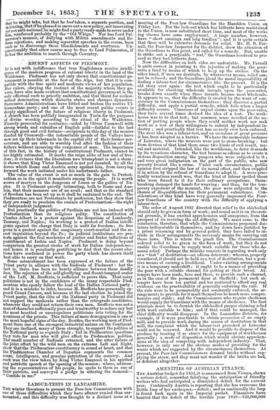LABOUR-TESTS IN LANCASHIRE.
Tim winter threatens to present the Poor-law Commissioners with one of those difficulties which they have oftener evaded than sur- mounted; and this difficulty was brought to a distinct issue at a
meeting of the Poor-law Guardians for the Hazelden Union on Friday last. For the lock-out which has hitherto been maintained in the Union, is now substituted short time, and most of the work- ing classes have some employment. A large number, however, have " short earnings and long families "; and it is quite certain that there will be extensive demands for relief. Mr. H. B. Far- nall, the Poor-law Inspector for the district, drew the attention of the Guardians to this point, and called for a remedy. But, unable to strike out a practicable " test," the Guardians resolved to pro- ceed as they had hitherto done.
Now the difficulties on both sides are undeniable. Mr. Farnall is quite correct in pointing to the injustice of making the poor- rates a fund by means of which to keep up the strikes. On the other hand, if men are destitute, by whatsoever means, relief can- not be refused ; and the Guardians plead the moral impossibility of finding a labour-test for circumstances like the present. It is the old story over again : the test which ought to be particularly available for checking wholesale inroads upon the poor-rates, breaks down exactly when those inroads become most wholesale. It appears to us, that the difficulty is created by the want of con- sistency in the Commissioners themselves : they discover a partial difficulty, and apply a partial remedy, which fails when a larger difficulty occurs. Conscious of unjust claims upon the poor-rates, they have several times devised the idea of a test. The work- house was to be that test; but common sense revolted at the no- tion of putting people where they could neither work nor seek work as a test of their willingness to subsist by independent in- dustry ; and practically that test has scarcely ever been enforced. The next idea was a labour-test, and on occasions of great pressure it has been adopted as a barrier. We have the memorable instance of Leicester, where the weavers were put to stone-breaking : but from devices of that kind there arose two kinds of evil result, mo- ral and material. Intended, like the workhouse, to deter demands by its vexatious character, the test became so odious as to create a riotous disposition among the paupers who were subjected to it ; and very great indignation on the part of the public, who saw poverty treated like a crime. Under such circumstances, public opinion first stripped the law of its moral effect, and then crippled it in action by the refusal of Guardians to adopt it. A more prac- tically vexations result was, that the kind of labour spoiled those who were forced to it for their ordinary occupations. Stone- breaking damaged the hands for weaving ; and thus, for the tem- porary expedient of the moment, the poor were subjected to the chance of disqualification for their permanent subsistence. Coi- siderations of this kind have very generally impressed the Poor law Guardians of the country with the difficulty of applying a labour-test.
The order of August 1852 directed that relief to the ablebodied should only be given in form of work; and sound as it is on theoreti- cal grounds, it has excited apprehension and annoyance, from the prospect of its reviving the old difficulty. We must come to the conclusion, therefore, that while the Commissioners propound doc- trines indisputable in themselves, and lay down Taws justified by a priori reasoning and by general policy, they have failed to in- clude in their arrangements the necessary means for carrying out those laws. This is where the pinch lies. The Commissioners ordered relief to be given in the form of work, but they do not enable the Guardians to supply work suitable for those who de- mand relief. Perhaps the mistake consists in regarding work only as a " test " of destitution—an odious deterrent ; whereas, properly considered, it should not be held as a test of destitution, but a posi- tive means of earning a livelihood. Under existing arrangements it is a temporary makeshift ; it ought to be a means of providing the poor with a reliable channel for getting at their bread. At- tempts have been made, here and there, to provide such a channel, as in the case of the permanent farm at Sheffield ; but such at- tempts have been too partial and too scattered to afford any real evidence on the practicability of generally enforcing the rule. If the rule were to be permanently and constantly enforced, the ar- rangements to provide for it must themselves be much more compre- hensive and stable • and the Commissioners who require obedience
would supply the stable; with the means of obedience. The first principle must be to furnish the ablebodied pauper claiming relief with work suitable to him ; and if that could be managed, the chief difficulty would disappear. In the Lancashire districts, for example, if it were practicable to obtain possession of an empty mill, and to provide work during the season of destitution in that mill, the complaint which the labour-test provoked at Leicester
could not be renewed. And it would be possible to dispose of the produce by treating it as stores for the equipment of workhouses generally ; a mode of disposition which would obviate apprehen- sions at the idea of competing with independent industry. That, however, is only one of the obvious modes of providing for the wants which are suggested by the circumstances themselves. At present, the Poor-law Commissioners demand bricks without sup- plying the straw, and they must not wonder if the bricks are bad, or deficient altogether.


































 Previous page
Previous page